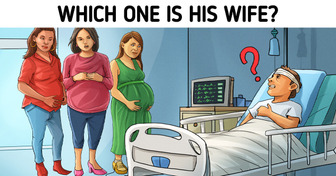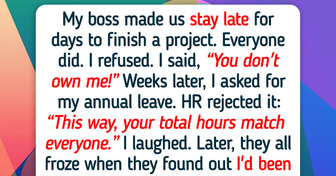Lisa Bonet and Jason Momoa: this is what happens when you marry in completely different states of life (a man who refuses to grow up). Been there, done that.
What Is a “Divorce Gene” and Why Some Couples Split Out of the Blue, According to Science

We inherit our eye color, body shape, and blood type from our parents. Our genes control our physical traits, but, surprisingly, they can also lead us in our behavior. For example, we all used to believe that if a couple gets divorced, it’s all because of their psychology, or the chemistry between them is gone. But recent studies have unveiled a shocking truth: divorce may be in our genes.
Here at Bright Side, we couldn’t keep from sharing what scientists have discovered about the so-called “divorce gene.” Take a look at this mind-teasing genetic game together with us!
Our DNA plays a big part in how much we argue.
Scientists claim the gene affects how women process oxytocin, which is the “cuddle hormone.” It also promotes feelings of love and affection. Women who have the oxytocin affecting gene, are 50% more likely to claim that they’re unhappy in their marriage or even that they are close to a divorce. They just may not be able to bond normally with their partners because of this gene.
Genes also decide if a man will be faithful to his spouse.
Surprisingly, it’s not only the upbringing or the character of a man that decides if he will be committed to one and the same woman. Scientists found that there’s a special gene that is responsible for faithfulness.
Just like women, men have their own hormone that is responsible for bonding and commitment. It’s called vasopressin and some men have a mutation in a related gene. If a man has this gene mutation, he is less likely to be monogamous, so there’s a risk that he’ll be unfaithful to his spouse.
Scientists even suggest the imaginary situation that a woman can use to test her potential husband for faithfulness. All she might need for this is a sample of his saliva sent for genetic testing by a special app.
Parents can pass the special “divorce gene” to their kids too.
Children of divorced parents have more of a chance to divorce their spouses when compared to kids who were raised in 2-parent families. And studies suggest that it’s not the upbringing, but genetic factors that may be to blame.
Studies were done involving kids who were adopted into families and who grew up with adoptive parents. The results were overwhelming: it turns out, the kids inherited their histories of divorce, but not from their adoptive parents. They inherited it from their biological parents. And this happened even if they were separated from their biological parents at a very young age.
What do you think about the “divorce gene”? Which factor, in your opinion, is more important in divorce: the example that parents set or the genes themselves?
Comments
Related Reads
11 Riddles That Toasted Our Brain Like a Marshmallow

15 Pics Showing How Beauty Standards Have Changed Over the Years, According to Miss Universe

I Was Denied My Vacation Leave Because I Refused to Work Overtime

11 Real Stories That Show Kindness Can Hurt, but Is Always Worth It

I Refuse to Let My Homeless Stepdaughter Move In, This Is Not an Affordable Housing

I Charged My MIL for Christmas Dinner, Even Though She’s Always Helped Us for Free

I Refuse to Be My Stepson’s 24/7 Uber—I’m His Stepdad, Not His Driver

I Refused to Be Humiliated by My MIL, So I Quickly Responded With the Ultimate Payback

20 Times Quiet Kindness Defeated the Dark Side of People

13 Stories of Quiet Kindness That Show Superhuman Strength in Ordinary People

I Refused to Watch My DIL Give Birth— She Made Sure I Regretted That Moment

I Refuse to Earn Less Just Because They Found a Cheaper Version of Me





